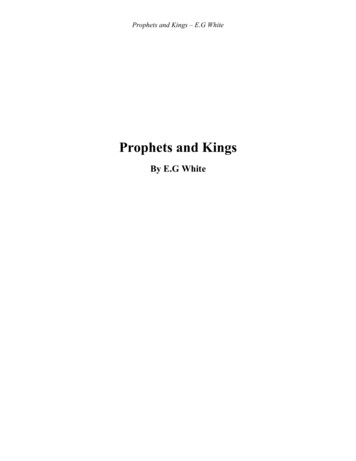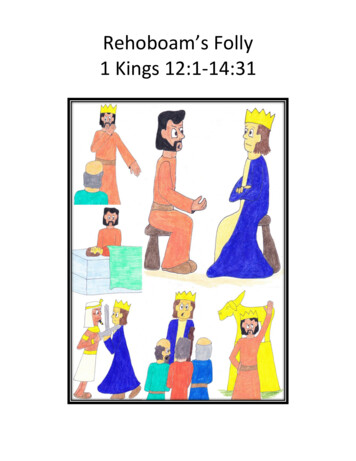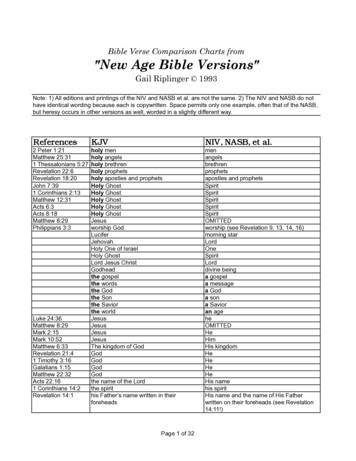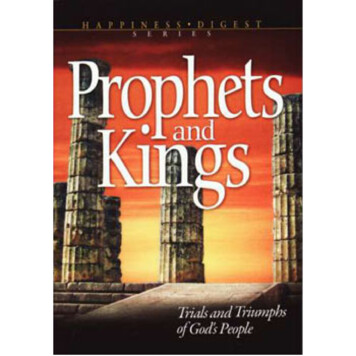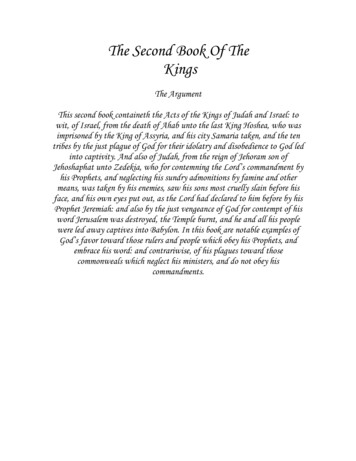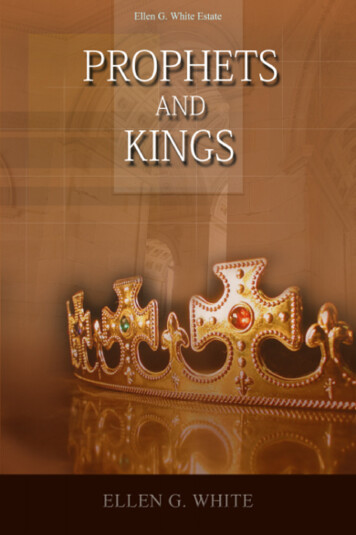
Transcription
Prophets and KingsEllen G. White1917
Information about this BookOverviewThis ePub publication is provided as a service of the Ellen G. White Estate.It is part of a larger collection. Please visit the Ellen G. White Estate website fora complete list of available publications.About the AuthorEllen G. White (1827-1915) is considered the most widely translatedAmerican author, her works having been published in more than 160 languages.She wrote more than 100,000 pages on a wide variety of spiritual and practicaltopics. Guided by the Holy Spirit, she exalted Jesus and pointed to the Scripturesas the basis of one’s faith.Further LinksA Brief Biography of Ellen G. WhiteAbout the Ellen G. White EstateEnd User License AgreementThe viewing, printing or downloading of this book grants you only alimited, nonexclusive and nontransferable license for use solely by you foryour own personal use. This license does not permit republication, distribution,assignment, sublicense, sale, preparation of derivative works, or other use. Anyunauthorized use of this book terminates the license granted hereby. Copyright 2010 by the Ellen G. White Estate, Inc.For more information about the author, publishers, or how you can supportthis service, please contact the Ellen G. White Estate: (email address). We arethankful for your interest and feedback and wish you God’s blessing as you read.
FOREWORDThe Story of Prophets and Kings is the second in a series of five outstandingvolumes spanning sacred history. It was, however, the last book of the seriesto be written, and the last of many rich works to come from the gifted pen ofEllen G. White. Through her seventy years of speaking and writing in Americaand abroad, Mrs. White ever kept before the public the larger significance of theevents of history, revealing that in the affairs of men are to be detected the unseeninfluences of righteousness and evil—the hand of God and the work of the greatadversary.The author with deep insight in providential workings draws the curtain asideand reveals a philosophy of history by which the events of the past take on eternalsignificance. She expressed this philosophy in this way:“The strength of nations and of individuals is not found in the opportunitiesand facilities that appear to make them invincible; It is not found in their boastedgreatness. That which alone can make them great or strong is the power andpurpose of God. They themselves by their attitude toward his purpose, decidetheir own destiny.“Human histories relate man’s achievements, his victories in battle, hissuccess in climbing to worldly greatness. God’s history describes man as heavenviews Him.”This volume, Prophets and Kings, opens with the account of Solomon’sglorious reign over Israel, a united kingdom, with the temple of Jehovah—thecenter of true worship. Here are traced the vicissitudes of a favored and chosenpeople, torn between allegiance to God and serving the Gods of the nations aboutthem. And here are seen vividly, through a crucial period of this world’s history,the dramatic evidences of the raging conflict between Christ and Satan for thehearts and allegiance of men.The book abounds in fascinating character studies—the wise
Solomon, whose wisdom did not keep him from transgression; Jeroboam,the self-serving man of policy, and the evil results which followed his reign; Themighty and fearless Elijah; Elisha, the prophet of peace and healing; Ahaz, thefearful and wicked; Hezekiah, the loyal and good-hearted; Daniel, the beloved ofGod; Jeremiah, the prophet of sorrow; Haggai, Zechariah, and Malachi, prophetsof the restoration. Beyond them all rises in glory the coming King, the Lamb ofGod, the only-begotten Son, in whom the typical sacrifices find fulfillment.Patriarchs and Prophets, the first book of the series, spans world history fromcreation to the close of David’s reign; The Desire of Ages, the third book, treatsof the life and ministry of Christ; this volume, Prophets and Kings fits betweenthese two. The Acts of the Apostles, The fourth, portrays the history of the earlyChristian church, and The Great Controversy, the last in the series, traces theconflict story to our day and then on in a prophetic vein to the earth made new.The Story of Prophets and Kings, having enjoyed a circulation which hasdemanded many printings since its first appearance, is now presented to thepublic in attractive form with type reset, but with no change of text or pagination.This new edition is embellished with attractive illustrations, many of themoriginal paintings designed especially for this work.That this volume with its rich lessons of faith in God and His Son, theSaviour of the world, and the stories of his providence in the lives of great menand women of Old Testament times may deepen the religious experience andenlighten the minds of all who read its pages is the sincere wish of the PublishersandThe Board of Trustees of the Ellen G. White Publications.
ContentsInformation about this Book . . .Overview . . . . . . . . . .About the Author . . . . . .Further Links . . . . . . . .End User License AgreementFOREWORD . . . . . . . . . . .The Vineyard of the Lord . . . . .Section I – From Strength to WeaknessChap. 1 - Solomon . . . . . . . . . . .Chap. 2 - The Temple and Its DedicationChap. 3 - Pride of Prosperity . . . . . .Chap. 4 - Results of Transgression . . .Chap. 5 - Solomon’s Repentance . . . .Chap. 6 - The Rending of the KingdomChap. 7 - Jeroboam . . . . . . . . . . .Chap. 8 - National Apostasy . . . . . .11111915.2325355161758799109Section II – Prophets of the Northern KingdomChap. 9 - Elijah the Tishbite . . . . . . . . . .Chap. 10 - The Voice of Stern Rebuke . . . . .Chap. 11 - Carmel . . . . . . . . . . . . . . . .Chap. 12 - From Jezreel to Horeb . . . . . . . .Chap. 13 - “What Doest Thou Here?” . . . . .Chap. 14 - “In the Spirit and Power of Elias” . .Chap. 15 - Jehoshaphat . . . . . . . . . . . . .Chap. 16 - The Fall of the House of Ahab . . .Chap. 17 - The Call of Elisha . . . . . . . . . .Chap. 18 - The Healing of the Waters . . . . .Chap. 19 - A Prophet of Peace . . . . . . . . .Chap. 20 - Naaman . . . . . . . . . . . . . . .Chap. 21 - Elisha’s Closing Ministry . . . . . .Chap. 22 - “Nineveh, That Great City” . . . . .Chap. 23 - The Assyrian Captivity . . . . . . .Chap. 24 - “Destroyed for Lack of 44254265279293.Section III – A Preacher of Righteousness301Chap. 25 - The Call of Isaiah . . . . . . . . . . . . . . . . . . . . . . 303Chap. 26 - “Behold Your God!” . . . . . . . . . . . . . . . . . . . . 311Chap. 27 - Ahaz . . . . . . . . . . . . . . . . . . . . . . . . . . . . . 322
Chap.Chap.Chap.Chap.28 - Hezekiah . . . . . . . . . . . .29 - The Ambassadors From Babylon30 - Deliverance From Assyria . . .31 - Hope for the Heathen . . . . . .331340349367Section IV – National RetributionChap. 32 - Manasseh and Josiah . . . .Chap. 33 - The Book of the Law . . . .Chap. 34 - Jeremiah . . . . . . . . . . .Chap. 35 - Approaching Doom . . . . .Chap. 36 - The Last King of Judah . . .Chap. 37 - Carried Captive Into BabylonChap. 38 - Light Through Darkness . .379381392407422440452464Section V – In the Lands of the HeathenChap. 39 - In the Court of Babylon . .Chap. 40 - Nebuchadnezzar’s Dream .Chap. 41 - The Fiery Furnace . . . . .Chap. 42 - True Greatness . . . . . .Chap. 43 - The Unseen Watcher . . .Chap. 44 - In the Lions’ Den . . . . .477479491503514522539Section VI – After the ExileChap. 45 - The Return of the Exiles . . . . . . .Chap. 46 - “The Prophets of God Helping Them”Chap. 47 - Joshua and the Angel . . . . . . . . .Chap. 48 - “Not by Might, nor by Power” . . . .Chap. 49 - In the Days of Queen Esther . . . . .Chap. 50 - Ezra, the Priest and Scribe . . . . . .Chap. 51 - A Spiritual Revival . . . . . . . . . .Chap. 52 - A Man of Opportunity . . . . . . . .Chap. 53 - The Builders on the Wall . . . . . . .Chap. 54 - A Rebuke Against Extortion . . . . .Chap. 55 - Heathen Plots . . . . . . . . . . . . .Chap. 56 - Instructed in the Law of God . . . . .Chap. 57 - Reformation . . . . . . . . . . . . . n VII – Light at Eventide679Chap. 58 - The Coming of a Deliverer . . . . . . . . . . . . . . . . . 681Chap. 59 - “The House of Israel” . . . . . . . . . . . . . . . . . . . . 703Chap. 60 - Visions of Future Glory . . . . . . . . . . . . . . . . . . . 722
The Vineyard of the LordIt was for the purpose of bringing the best gifts of Heaven to all the peoplesof earth that God called Abraham out from his idolatrous kindred and bade himdwell in the land of Canaan. “I will make of thee a great nation,” He said, “and Iwill bless thee, and make thy name great; and thou shalt be a blessing.” Genesis12:2. It was a high honor to which Abraham was called—that of being the fatherof the people who for centuries were to be the guardians and preservers of thetruth of God to the world, the people through whom all the nations of the earthshould be blessed in the advent of the promised Messiah.Men had well-nigh lost the knowledge of the true God. Their minds weredarkened by idolatry. For the divine statutes, which are “holy, and just, andgood” (Romans 7:12), men were endeavoring to substitute laws in harmony withthe purposes of their own cruel, selfish hearts. Yet God in his mercy did notblot them out of existence. He purposed to give them opportunity for becomingacquainted with him15
through his church. He designed that the principles revealed through his peopleshould be the means of restoring the moral image of God in man.God’s law must be exalted, his authority maintained; and to the house ofIsrael was given this great and noble work. God separated them from the world,that He might commit to them a sacred trust. He made them the depositaries ofhis law, and He purposed through them to preserve among men the knowledgeof himself. Thus the light of heaven was to shine out to a world enshroudedin darkness, and a voice was to be heard appealing to all peoples to turn fromidolatry to serve the living God.“With great power, and with a mighty hand,” God brought his chosen peopleout of the land of Egypt. Exodus 32:11. “He sent Moses his servant; and Aaronwhom he had chosen. They showed his signs among them, and wonders in theland of Ham.” “He rebuked the Red Sea also, and it was dried up: so He led themthrough the depths.” Psalm 105:26, 27; 106:9. He rescued them from their servilestate, that He might bring them to a good land, a land which in his providence Hehad prepared for them as a refuge from their enemies. He would bring them tohimself and encircle them in his everlasting arms; and in return for his goodnessand mercy they were to exalt his name and make it glorious in the earth.16
“The Lord’s portion is his people; Jacob is the lot of his inheritance. Hefound him in a desert land, and in the waste howling wilderness; He led himabout, He instructed him, He kept him as the apple of his eye. As an eaglestirreth up her nest, fluttereth over her young, spreadeth abroad her wings, takeththem, beareth them on her wings: so the Lord alone did lead him, and therewas no strange God with him.” Deuteronomy 32:9-12. Thus He brought theIsraelites unto himself, that they might dwell as under the shadow of the MostHigh. Miraculously preserved from the perils of the wilderness wandering, theywere finally established in the Land of Promise as a favored nation.By means of a parable, Isaiah has told with touching pathos the story ofIsrael’s call and training to stand in the world as Jehovah’s representatives,fruitful in every good work:“Now will I sing to my well-beloved a song of my beloved touching hisvineyard. My well-beloved hath a vineyard in a very fruitful hill: and He fencedit, and gathered out the stones thereof, and planted it with the choicest vine, andbuilt a tower in the midst of it, and also made a wine press therein: and He lookedthat it should bring forth grapes.” Isaiah 5:1, 2.Through the chosen nation, God had purposed to bring blessing to allmankind. “The vineyard of the Lord of hosts,”17
the prophet declared, “is the house of Israel, and the men of Judah his pleasantplant.” Isaiah 5:7.To this people were committed the oracles of God. They were hedged aboutby the precepts of his law, the everlasting principles of truth, justice, and purity.Obedience to these principles was to be their protection, for it would save themfrom destroying themselves by sinful practices. And as the tower in the vineyard,God placed in the midst of the land his holy temple.Christ was their instructor. As He had been with them in the wilderness,so He was still to be their teacher and guide. In the tabernacle and the templehis glory dwelt in the holy Shekinah above the mercy seat. In their behalf Heconstantly manifested the riches of his love and patience.Through Moses the purpose of God was set before them and the terms of theirprosperity made plain. “Thou art an holy people unto the Lord thy God,” he said;“the Lord thy God hath chosen thee to be a special people unto himself, above allpeople that are upon the face of the earth.”“Thou hast avouched the Lord this day to be thy God, and to walk in hisways, and to keep his statutes, and his commandments, and his judgments, andto hearken unto his voice: and the Lord hath avouched thee this day to be hispeculiar people, as He hath promised thee, and that thou shouldest keep all hiscommandments; and to make thee18
high above all nations which He hath made, in praise, and in name, and inhonor; and that thou mayest be an holy people unto the Lord thy God, as Hehath spoken.” Deuteronomy 7:6; 26:17-19.The children of Israel were to occupy all the territory which God appointedthem. Those nations that rejected the worship and service of the true God were tobe dispossessed. But it was God’s purpose that by the revelation of his characterthrough Israel men should be drawn unto him. To all the world the gospelinvitation was to be given. Through the teaching of the sacrificial service, Christwas to be uplifted before the nations, and all who would look unto him shouldlive. All who, like Rahab the Canaanite and Ruth the Moabitess, turned fromidolatry to the worship of the true God were to unite themselves with his chosenpeople. As the numbers of Israel increased, they were to enlarge their bordersuntil their kingdom should embrace the world.But ancient Israel did not fulfill God’s purpose. The Lord declared, “I hadplanted thee a noble vine, wholly a right seed: how then art thou turned intothe degenerate plant of a strange vine unto Me?” “Israel is an empty vine, hebringeth forth fruit unto himself.” “And now, O inhabitants of Jerusalem, andmen of Judah, judge, I pray you, betwixt Me and my vineyard. What could havebeen done more to my vineyard, that I have not done in it? Wherefore, when I19
looked that it should bring forth grapes, brought it forth wild grapes? And nowgo to; I will tell you what I will do to my vineyard: I will take away the hedgethereof, and it shall be eaten up; and break down the wall thereof, and it shallbe trodden down: and I will lay it waste: it shall not be pruned, nor digged; butthere shall come up briers and thorns: I will also command the clouds that theyrain no rain upon it. For . He looked for judgment, but behold oppression; forrighteousness, but behold a cry.” Jeremiah 2:21; Hosea 10:1; Isaiah 5:3-7.The Lord had through Moses set before his people the result of unfaithfulness.By refusing to keep his covenant, they would cut themselves off from the life ofGod, and his blessing could not come upon them. At times these warnings wereheeded, and rich blessings were bestowed upon the Jewish nation and throughthem upon surrounding peoples. But more often in their history they forgot Godand lost sight of their high privilege as his representatives. They robbed him ofthe service He required of them, and they robbed their fellow men of religiousguidance and a holy example. They desired to appropriate to themselves the fruitsof the vineyard over which they had been made stewards. Their covetousness andgreed caused them to be despised even by the heathen. Thus the Gentile worldwas20
given occasion to misinterpret the character of God and the laws of his kingdom.With a father’s heart, God bore with his people. He pleaded with them bymercies given and mercies withdrawn. Patiently He set their sins before them andin forbearance waited for their acknowledgment. Prophets and messengers weresent to urge his claim upon the husbandmen; but, instead of being welcomed,these men of discernment and spiritual power were treated as enemies. Thehusbandmen persecuted and killed them. God sent still other messengers, butthey received the same treatment as the first, only that the husbandmen showedstill more determined hatred.The withdrawal of divine favor during the period of the Exile led manyto repentance, yet after their return to the Land of Promise the Jewish peoplerepeated the mistakes of former generations and brought themselves into politicalconflict with surrounding nations. The prophets whom God sent to correct theprevailing evils were received with the same suspicion and scorn that had beenaccorded the messengers of earlier times; and thus, from century to century, thekeepers of the vineyard added to their guilt.The goodly vine planted by the divine Husbandman upon the hills of Palestinewas despised by the men of Israel and was finally cast over the vineyard wall; theybruised it and21
trampled it under their feet and hoped that they had destroyed it forever. TheHusbandman removed the vine and concealed it from their sight. Again Heplanted it, but on the other side of the wall and in such a manner that the stockwas no longer visible. The branches hung over the wall, and grafts might bejoined to it; but the stem itself was placed beyond the power of men to reach orharm.Of special value to God’s church on earth today—the keepers of hisvineyard—are the messages of counsel and admonition given through theprophets who have made plain his eternal purpose in behalf of mankind. Inthe teachings of the prophets, his love for the lost race and his plan for theirsalvation are clearly revealed. The story of Israel’s call, of their successes andfailures, of their restoration to divine favor, of their rejection of the Master of thevineyard, and of the carrying out of the plan of the ages by a goodly remnant towhom are to be fulfilled all the covenant promises—this has been the theme ofGod’s messengers to his church throughout the centuries that have passed. Andtoday God’s message to his church—to those who are occupying his vineyard asfaithful husbandmen—is none other than that spoken through the prophet of old:“Sing ye unto her, A vineyard of red wine. I the Lord do keep it; I will water itevery moment: lest any hurt it, I will keep it night and day.” Isaiah 27:2, 3.Let Israel hope in God. The Master of the vineyard is even now gatheringfrom among men of all nations and peoples the precious fruits for which He haslong been waiting. Soon He will come unto his own; and in that glad day hiseternal purpose for the house of Israel will finally be fulfilled. “He shall causethem that come of Jacob to take root: Israel shall blossom and bud, and fill theface of the world with fruit.” Verse 6.22
Section I – From Strength toWeakness23
From Strength to Weakness “Thus saith the Lord, Let not the wise manglory in his wisdom, neither let the mighty man glory in his might, let notthe rich man glory in his riches: but let him that glorieth glory in this,that he understandeth and knoweth Me, that I am the Lord which exerciseloving-kindness, judgment, and righteousness, in the earth: for in these thingsI delight, saith the Lord.” Jeremiah 9:23, 24.24
Chap. 1 - SolomonIn the reign of David and Solomon, Israel became strong among the nationsand had many opportunities to wield a mighty influence in behalf of truth andthe right. The name of Jehovah was exalted and held in honor, and the purposefor which the Israelites had been established in the Land of Promise bade fairof meeting with fulfillment. Barriers were broken down, and seekers after truthfrom the lands of the heathen were not turned away unsatisfied. Conversions tookplace, and the church of God on earth was enlarged and prospered.Solomon was anointed and proclaimed king in the closing years of his fatherDavid, who abdicated in his favor. His early life was bright with promise, and itwas God’s purpose that he should go on from strength to strength, from glory toglory, ever approaching nearer the similitude of the character of God, and thusinspiring his people to fulfill their sacred trust as the depositaries of divine truth.25
David knew that God’s high purpose for Israel could be met only as rulersand people should seek with unceasing vigilance to attain to the standard placedbefore them. He knew that in order for his son Solomon to fulfill the trust withwhich God was pleased to honor him, the youthful ruler must be not merelya warrior, a statesman, and a sovereign, but a strong, good man, a teacher ofrighteousness, an example of fidelity.With tender earnestness David entreated Solomon to be manly and noble,to show mercy and loving-kindness to his subjects, and in all his dealings withthe nations of earth to honor and glorify the name of God and to make manifestthe beauty of holiness. The many trying and remarkable experiences throughwhich David had passed during his lifetime had taught him the value of the noblervirtues and led him to declare in his dying charge to Solomon: “He that rulethover men must be just, ruling in the fear of God. And he shall be as the light ofthe morning, when the sun riseth, even a morning without clouds; as the tendergrass springing out of the earth by clear shining after rain.” 2 Samuel 23:3, 4.Oh, what an opportunity was Solomon’s! Should he follow the divinelyinspired instruction of his father, his reign would be a reign of righteousness,like that described in the seventy-second psalm:“Give the king Thy judgments, O God,And Thy righteousness unto the king’s son.He shall judge Thy people with righteousness,And Thy poor with judgment.He shall come down like rain upon the mown grass:As showers that water the earth.26
In his days shall the righteous flourish;And abundance of peace so long as the moon endureth.He shall have dominion also from sea to sea,And from the river unto the ends of the earth.The kings of Tarshish and of the isles shall bring presents:The kings of Sheba and Seba shall offer gifts.Yea, all kings shall fall down before him:All nations shall serve him.For he shall deliver the needy when he crieth;The poor also, and him that hath no helper.Prayer also shall be made for him continually;And daily shall he be praised.His name shall endure forever:His name shall be continued as long as the sun:And men shall be blessed in him:All nations shall call him blessed.“Blessed be the Lord God, the God of Israel,Who only doeth wondrous things.And blessed be his glorious name forever:And let the whole earth be filled with his glory;Amen, and Amen.”In his youth Solomon made David’s choice his own, and for many yearshe walked uprightly, his life marked with strict obedience to God’s commands.Early in his reign he went with his counselors of state to Gibeon, where thetabernacle that had been built in the wilderness still was, and there he united withhis chosen advisers, “the captains of thousands and of hundreds,” “the judges,”and “every governor in all Israel, the chief of the fathers,” in offering sacrificesto God and in consecrating themselves fully to the Lord’s service. 2 Chronicles1:2. Comprehending something of the magnitude of the duties connected withthe kingly office, Solomon knew that those bearing heavy burdens must27
seek the Source of Wisdom for guidance, if they would fulfill theirresponsibilities acceptably. This led him to encourage his counselors to unitewith him heartily in making sure of their acceptance with God.Above every earthly good, the king desired wisdom and understanding for theaccomplishment of the work God had given him to do. He longed for quicknessof mind, for largeness of heart, for tenderness of spirit. That night the Lordappeared to Solomon in a dream and said, “Ask what I shall give thee.” Inhis answer the young and inexperienced ruler gave utterance to his feeling ofhelplessness and his desire for aid. “Thou hast showed unto Thy servant Davidmy father great mercy,” he said, “according as he walked before Thee in truth,and in righteousness, and in uprightness of heart with Thee; and Thou hast keptfor him this great kindness, that Thou hast given him a son to sit on his throne,as it is this day.“And now, O Lord my God, Thou hast made Thy servant king instead ofDavid my father: and I am but a little child: I know not how to go out or come in.And Thy servant is in the midst of Thy people which Thou hast chosen, a greatpeople, that cannot be numbered nor counted for multitude. Give therefore Thyservant an understanding heart to judge Thy people, that I may discern betweengood and bad: for who is able to judge this Thy so great a people?“And the speech pleased the Lord, that Solomon had asked this thing.”“Because this was in thine heart,” God said to Solomon, “and thou hast notasked riches, wealth, or honor, nor the life of thine enemies, neither yet hast askedlong life; but hast asked wisdom and knowledge for thyself, that thou mayest28
judge my people,” “behold, I have done according to thy words: lo, I have giventhee a wise and an understanding heart; so that there was none like thee beforethee, neither after thee shall any arise like unto thee. And I have also given theethat which thou hast not asked, both riches, and honor,” “such as none of thekings have had that have been before thee, neither shall there any after thee havethe like.”“And if thou wilt walk in my ways, to keep my statutes and mycommandments, as thy father David did walk, then I will lengthen thy days.”1 Kings 3:5-14; 2 Chronicles 1:7-12.29
God promised that as He had been with David, so He would be with Solomon.If the king would walk before the Lord in uprightness, if he would do what Godhad commanded him, his throne would be established and his reign would be themeans of exalting Israel as “a wise and understanding people,” the light of thesurrounding nations. Deuteronomy 4:6.The language used by Solomon while praying to God before the ancientaltar at Gibeon reveals his humility and his strong desire to honor God. Herealized that without divine aid he was as helpless as a little child to fulfill theresponsibilities resting on him. He knew that he lacked discernment, and it wasa sense of his great need that led him to seek God for wisdom. In his heart therewas no selfish aspirations for a knowledge that would exalt him above others. Hedesired to discharge faithfully the duties devolving upon him, and he chose thegift that would be the means of causing his reign to bring glory to God. Solomonwas never so rich or so wise or so truly great as when he confessed, “I am but alittle child: I know not how to go out or come in.”Those who today occupy positions of trust should seek to learn the lessontaught by Solomon’s prayer. The higher the position a man occupies, the greaterthe responsibility that he has to bear, the wider will be the influence that he exertsand the greater his need of dependence on God. Ever should he remember thatwith the call to work comes the call to walk circumspectly before his fellow men.He is to stand before God in the attitude of a learner. Position does not giveholiness of character. It is by honoring God and30
obeying his commands that a man is made truly great.The God whom we serve is no respecter of persons. He who gave to Solomonthe spirit of wise discernment is willing to impart the same blessing to hischildren today. “If any of you lack wisdom,” his word declares, “let him askof God, that giveth to all men liberally, and upbraideth not; and it shall be givenhim.” James 1:5. When a burden bearer desires wisdom more than he desireswealth, power, or fame, he will not be disappointed. Such a one will learn fromthe Great Teacher not only what to do, but how to do it in a way that will meetwith the divine approval.So long as he remains consecrated, the man whom God has endowed withdiscernment and ability will not manifest an eagerness for high position, neitherwill he seek to rule or control. Of necessity men must bear responsibilities; butinstead of striving for the supremacy, he who is a true leader will pray for anunderstanding heart, to discern between good and evil.The path of men who are placed as leaders is not an easy one. But they areto see in every difficulty a call to prayer. Never are they to fail of consulting thegreat Source of all wisdom. Strengthened and enlightened by the Master Worker,they will be enabled to stand firm against unholy influences
FOREWORD The Story of Prophets and Kings is the second in a series of five outstanding volumes spanning sacred history. It was, however, the last book of the series to be written


